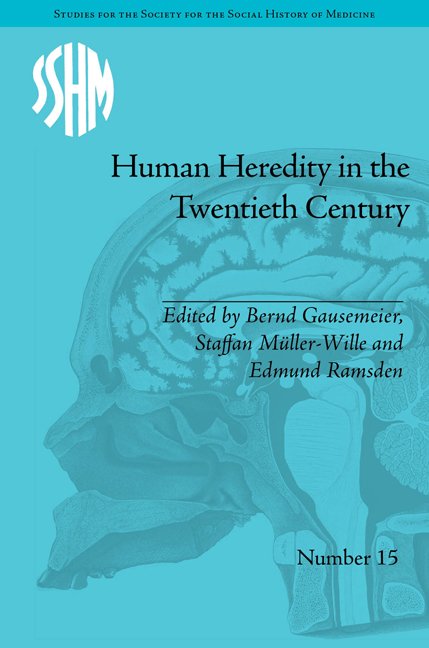Book contents
- Frontmatter
- Contents
- Acknowledgements
- List of Contributors
- List of Figures and Tables
- Introduction: Human Heredity in the Twentieth Century
- Part I Constructing Surveys of Heredity
- Part II Blood and Populations
- Part III Human Heredity in the Laboratory
- Part IV Understanding and Managing Disease
- Part V Reconstructing Discipline(s)
- Notes
- Index
Introduction: Human Heredity in the Twentieth Century
- Frontmatter
- Contents
- Acknowledgements
- List of Contributors
- List of Figures and Tables
- Introduction: Human Heredity in the Twentieth Century
- Part I Constructing Surveys of Heredity
- Part II Blood and Populations
- Part III Human Heredity in the Laboratory
- Part IV Understanding and Managing Disease
- Part V Reconstructing Discipline(s)
- Notes
- Index
Summary
Ideas and knowledge about the inheritance of physical and mental characters in humans, whether normal or pathological, form one of the most important elements of intellectual and scientific life of the twentieth century. From the heyday of explicitly eugenic projects and programmes in the early decades of the century, to the reconstitution of concerns with human heredity as ‘medical’ and ‘human’ genetics in the wake of World War II, to the campaign to ‘decode’ the human genome at the close of the century: the definition and control of hereditary traits have been a major concern, if not a metaphysical centrepiece, of biomedicine and public health. From our present-day perspective, we identify the scientific – as opposed to medical or political – endeavours in this field with the discipline of human genetics, that is, with scientific practices aiming at the determination of genetic factors affecting human characters. In this spirit, the twentieth century has been referred to, in critical retrospection, as the ‘century of the gene’. Yet not all projects and practices concerned with phenomena of human heredity in the twentieth century were focused on, or even concerned with, ‘genes’. Anthropological concepts of race and ethnicity, for example, continued to have a legacy in human genetics, as did medical ideas about susceptibility or constitutional disposition, and sociological and psychological ideas regarding class, inheritance and ability.
- Type
- Chapter
- Information
- Human Heredity in the Twentieth Century , pp. 1 - 12Publisher: Pickering & ChattoFirst published in: 2014



